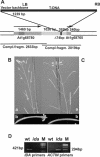Inflorescence deficient in abscission controls floral organ abscission in Arabidopsis and identifies a novel family of putative ligands in plants
- PMID: 12972671
- PMCID: PMC197296
- DOI: 10.1105/tpc.014365
Inflorescence deficient in abscission controls floral organ abscission in Arabidopsis and identifies a novel family of putative ligands in plants
Abstract
Abscission is an active process that enables plants to shed unwanted organs. Because the purpose of the flower is to facilitate pollination, it often is abscised after fertilization. We have identified an Arabidopsis ethylene-sensitive mutant, inflorescence deficient in abscission (ida), in which floral organs remain attached to the plant body after the shedding of mature seeds, even though a floral abscission zone develops. The IDA gene, positioned in the genomic DNA flanking the single T-DNA present in the ida line, was identified by complementation. The gene encodes a small protein with an N-terminal signal peptide, suggesting that the IDA protein is the ligand of an unknown receptor involved in the developmental control of floral abscission. We have identified Arabidopsis genes, and cDNAs from a variety of plant species, that encode similar proteins, which are distinct from known ligands. IDA and the IDA-like proteins may represent a new class of ligands in plants.
Figures







References
-
- Addicott, F.T. (1982). Abscission. (Berkeley: University of California Press).
-
- Baumbusch, L.O., Thorstensen, T., Krauss, V., Fischer, A., Naumann, K., Assalkhou, R., Schulz, I., Reuter, G., and Aalen, R.B. (2001). The Arabidopsis thaliana genome contains at least 29 active genes encoding SET domain proteins that can be assigned to four evolutionarily conserved classes. Nucleic Acids Res. 29, 4319–4333. - PMC - PubMed
-
- Bleecker, A.B., Estelle, M.A., Somerville, C., and Kende, H. (1988). Insensitivity to ethylene conferred by a dominant mutation in Arabidopsis thaliana. Science 241, 1086–1089. - PubMed
Publication types
MeSH terms
Substances
Associated data
- Actions
LinkOut - more resources
Full Text Sources
Other Literature Sources
Molecular Biology Databases

